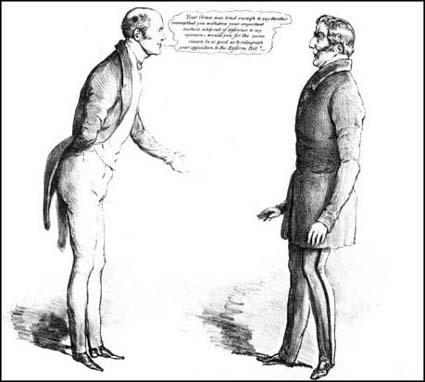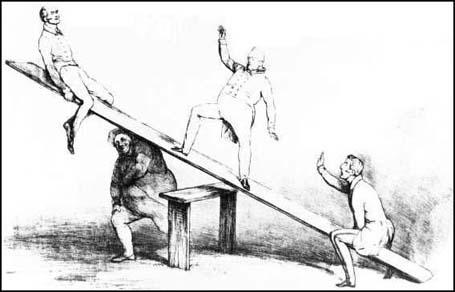John Doyle
John Doyle was born into an impoverished Roman Catholic family in Dublin in 1797. Doyle arrived in London in 1821 where he hoped to establish himself as a portrait painter. Although he occasionally exhibited at the Royal Academy he failed to sell enough pictures and by 1827 had turned to lithography.

with the Duke of Wellington. The drawing appeared in The Times on 23rd March, 1832.
Over the next few years he revolutionized the art of caricature and his work differed greatly from previous cartoonists such as Thomas Rowlandson and James Gillray who attempted to make their subjects look ugly and ridiculous. John Doyle concentrated on politicians, and although he favoured the Whigs, mainly because of their views on Catholic Emancipation, he was never too harsh on the Tories.

helping Earl Grey against William IV and the Duke of Wellington
Doyle's pictures appeared in The Times between 1829 and 1851. His drawings were always signed H.B. and at the time very few people knew his real name. Doyle's cartoons were daily commentaries of political events and were sometimes accompanied by an article explaining their meaning. John Doyle died on 2nd January 1868.
One of his sons, Richard Doyle, was also a cartoonist. His other son, Charles, was the father of the writer, Arthur Conan Doyle.
Primary Sources
(1) William Makepeace Thackeray, writing in 1840.
You never hear any laughing at H.B. (John Doyle), his pictures are a great deal too genteel for that - polite points of wit, which strike one as exceedingly clever and pretty, and cause one to smile in a quiet, gentlemanlike kind of way.
(2) Earl Grey collected John Doyle's drawings. Thomas Babington Macaulay wrote in July 1831 visiting 10 Downing Street while Grey was at the House of Lords.
I sat down and turned over two large portfolios of political caricatures. Earl Grey's face was in every print. I was very much diverted. I had seen some of them before; but many were new to me and their merit is extraordinary. They were the caricatures of that remarkable artist who calls himself H.B. (John Doyle).
Student Activities
Child Labour Simulation (Teacher Notes)
Richard Arkwright and the Factory System (Answer Commentary)
Robert Owen and New Lanark (Answer Commentary)
James Watt and Steam Power (Answer Commentary)
The Domestic System (Answer Commentary)
